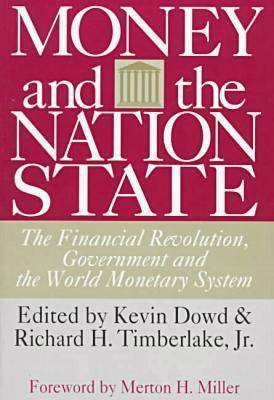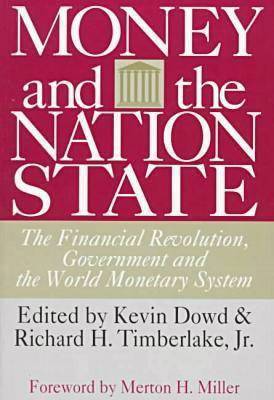
- Retrait gratuit dans votre magasin Club
- 7.000.000 titres dans notre catalogue
- Payer en toute sécurité
- Toujours un magasin près de chez vous
- Retrait gratuit dans votre magasin Club
- 7.000.0000 titres dans notre catalogue
- Payer en toute sécurité
- Toujours un magasin près de chez vous
Money and the Nation State
The Financial Revolution, Government and the World Monetary System
Kevin DowdDescription
Monetary and banking problems in the world today arise not so much from the failure of specific policies as from more deep-seated problems in institutional structures. Individuals clearly make mistakes and legislatures make bad laws, but the institutions from which decisions and laws emanate determine the effectiveness of social operations and the value of social decisions. Unless we change the present institutional structure, we are not likely to get stable solutions to today's most serious problems--ongoing and often erratic inflation and serious banking instability. Money and the Nation State examines the history of modern monetary and banking arrangements, some of the major monetary and banking problems, and options for meaningful reform.
The common theme of all the essays is that current arrangements result less from the accomplishments of great men than man-made institutions that society has inherited--central banks and "the legal and regulatory frameworks that accompany them. The contributors emphasize the impact of political interference on the workings of monetary and financial institutions. Not surprisingly, they find many problems arise because politically generated structures are inappropriate to the real needs of the individuals and groups they are meant to serve. Money and the Nation State provides an essential framework for those willing to return to first principles in thinking about the role of monetary institutions in economic life. Economists, financial theorists, and the interested citizen will find it stimulating reading.
Spécifications
Parties prenantes
- Auteur(s) :
- Editeur:
Contenu
- Nombre de pages :
- 453
- Langue:
- Anglais
- Collection :
Caractéristiques
- EAN:
- 9781560009306
- Date de parution :
- 02-02-97
- Format:
- Livre broché
- Format numérique:
- Trade paperback (VS)
- Dimensions :
- 154 mm x 229 mm
- Poids :
- 657 g

Les avis
Nous publions uniquement les avis qui respectent les conditions requises. Consultez nos conditions pour les avis.






